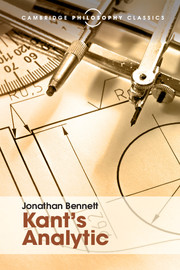3 - Space and objects
from Aesthetic
Published online by Cambridge University Press: 05 July 2016
Summary
Chaotic experience
I have discussed two attempts to derive from the premiss that the outer world must be spatial the conclusion that it must be perfectly Euclidean. In one of these, ‘spatial’ is equated with ‘exactly geometrizable’, and Euclid's is assumed to be the only possible geometry; while in the other, only our actual physical space is considered, and what is said about that is restricted to what could be learned about it from single glances. I want to turn now from the over-discussed conclusion of these two derivations to their common premiss, namely that outer experience must pertain to things in space—in a space, not necessarily in our space or even our kind of space.
I accept this premiss, and shall support it with arguments which I draw not from Kant but from the chapter ‘Sounds’ in Strawson's Individuals. My debt to this chapter is great. If I supply details which Strawson omits, or take his argument in directions which he does not explore, this is because my central concerns are not his.
If we ask, say, what makes a glimpse of a horse-race ‘outer’ and a certain buzzing sound ‘only inner’, we shall have to handle too many differences at once. We must therefore simplify, e.g. by considering one sense only. Smell, taste and sensitivity to temperature are too ill-organized; and sight and touch are too closely linked to physicality, and thus to the familiar contingencies of our kind of space, to be safely used. Strawson therefore adopts the heuristic fiction of a creature—I shall call him ‘the hearer’—whose sensory intake is all auditory.
Suppose that the hearer's sensory history consists in a chaos about which nothing general can be said except that it is auditory and chaotic. Can he find work for the distinction between ‘only inner’ and ‘outer’, i.e. between experiences which are just his auditory states and ones which are hearings of sounds that, independently of him, are there to be heard? Strawson's negative answer is right, of course, but I want to show in detail why.
- Type
- Chapter
- Information
- Kant's Analytic , pp. 35 - 46Publisher: Cambridge University PressPrint publication year: 2016
- 1
- Cited by

